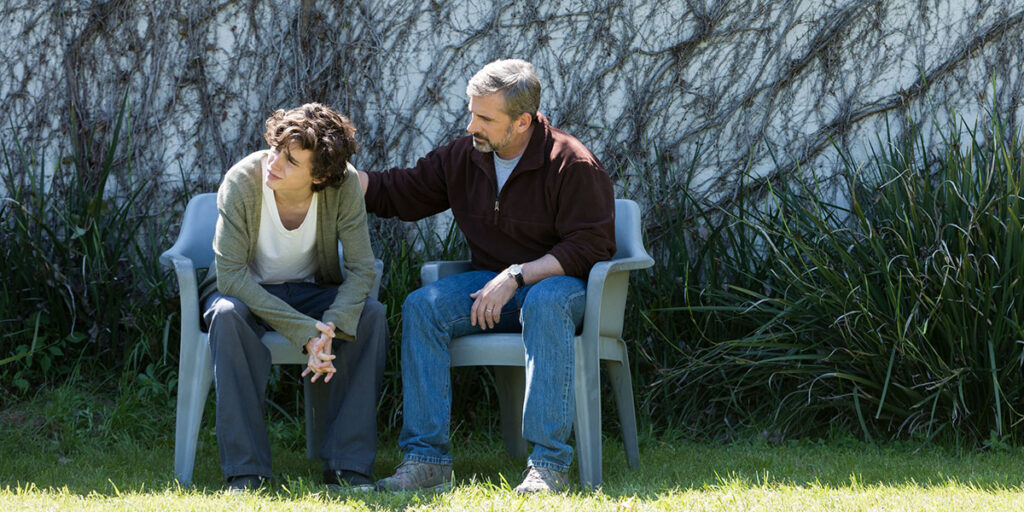I don’t write about them a lot, but fans of mine probably know that I have three sons. While I’m regularly trying to teach them lessons and values, I know that I won’t always be there to hold their hands. I thought about this truth while watching two highly-anticipated TIFF premieres about parents dealing with children who are addicted to drugs. Mine are too young to have that conversation now, but it’s coming sooner than I probably think, and I’m laying the groundwork for those decisions that will be made in the future. It’s comforting to think that the parent of an addict did “something wrong” that I won’t do, but we all know that’s not always true. Both of these films recognize the harsh reality of addiction in that it can happen to anyone, and parents often don’t know what to do when it impacts their lives. Both films are anchored by strong, truthful performances, even if screenwriting and directorial choices sometimes work against the performers.
That’s certainly true of Felix van Groeningen’s “Beautiful Boy,” which contains another phenomenal performance from Timothee Chalamet, nearly matching last year’s turn in “Call Me By Your Name.” Chalamet plays Nic Sheff, introduced to us already deep in the throes of addiction. Based on memoirs by its two central characters, “Beautiful Boy” actually starts with a heavy focus on David Sheff, played by Steve Carell, as he tries to figure out how to help his meth-addicted son. The film moves back and forth between Nic’s past and present, detailing how this relatively average kid felt he needed bigger and better highs to get through the day. The helplessness of addiction is there in Carell’s weary eyes. The actor deftly conveys how parents can’t do much for teenage addicts, and Chalamet completely captures the cycles of self-abuse often contained in young addicts. Nic gets down on himself for using and so uses to feel better and so crashes again and so uses again—and so on and so on. And David goes through all of the possible approaches, trying to help until he realizes perhaps there’s nothing he can do but be there when his son finally climbs out of his personal hell.
Clearly, there’s a lot to admire in “Beautiful Boy” on a performance level, but Carell and Chalamet’s work is often buried in frustrating filmmaking. Van Groeningen’s approach to drama is very similar to Jean-Marc Vallee’s, although at least the music in “Wild” felt like it was triggering memories for the characters instead of just serving as storytelling crutches as it often does here. As much as I really like the performances, “Beautiful Boy” over-uses montage and drove me somewhat crazy in its constant jumping from past to present. Sure, it’s designed to convey David Sheff’s frustration and mimic the cycles of recovery and relapse, but the editing and over-use of music montage bury the film’s greatest strengths: its two leading men.

Just as Carell and Chalamet are the best thing about “Beautiful Boy,” the same holds true of the leads in Peter Hedges’ “Ben is Back,” another story of young addiction, this one taking place on one evening instead of over years. While Hedges’ script gets a bit too convoluted in the second half, I appreciated the direct storytelling that simply allows Julia Roberts and Lucas Hedges to deliver.
Roberts reminds you how good she can be with the right material, playing a mother who comes home with her two kids on Christmas Eve morning only to find her other son Ben (Hedges, the son of the film’s director, by the way) waiting outside. He should be in rehab, where he’s been since he nearly died of a drug overdose, but he claims that his sponsor told him it was OK to come home for 24 hours for the holiday. Like so many kids in this country, Ben was prescribed painkillers for a sports injury and became an addict, even progressing to the point where he dealt to classmates. Now that he’s home for Christmas, Roberts’ Holly is ecstatic but terrified. The opening scenes of “Ben is Back” are fascinating in the way Roberts captures that blend of joy and absolute terror. She believes her son means well, but she still hides all the prescription drugs and even her jewelry.
These opening scenes are expertly done, especially in the fine-tuning of Hedges’ performance. The young Oscar nominee, also at TIFF in “Boy Erased” and “Mid90s,” does his best lead work to date in these scenes. He brilliantly embodies an addict’s own inner conflict in that he too is just as worried as his mother that he will fail. Every addict has that inner voice that tells them they can’t do it, and that they will only disappoint their loved ones. Hedges gives his first performance that feels truly adult, making his character’s pain palpable and relatable.
Sadly, “Ben is Back” gets a little convoluted with a plot twist that forces Ben and his mother on an all-night journey that’s really into Ben’s past. Without spoiling anything, Ben has to re-engage with a few of the people he ran with when he was a junkie and a dealer, and the triggers continue to rise, almost turning “Ben is Back” into a thriller more than a drama. I liked it more when it’s the latter, but there’s enough truth in Hedges and Roberts’ performances throughout.
Drug addiction continues to be a major American crisis, and both “Beautiful Boy” and “Ben is Back” offer insight into how we’ll deal with it in the years to come. It starts with understanding. And both of these films help by offering empathetic looks into the lives of parents with addict children. It could happen to anyone, and empathy is the only way to find true healing.












